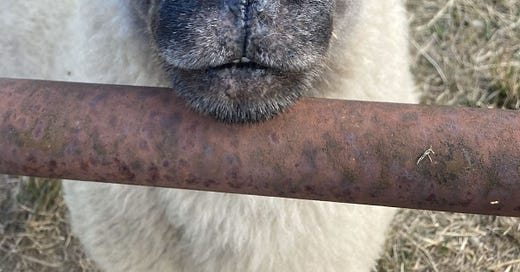Dear Dr. McNett,
Biosecurity screening, Pre-purchase exams, Wool vs. Hair sheep, Sheep social lives
Dear Dr. McNett is a weekly column of questions asked by readers. It is published each Tuesday. To submit your small stock questions please post them in the website chat, respond to the email newsletter or send a direct message.
Are there blood tests I should run on new sheep before I let them in with the rest of the flock?
In terms of blood tests, I recommend a biosecurity panel (this is the one we use which is ran at Washington State University). This test looks for chronic illnesses common to small ruminants, which may not be presenting symptomatically at the time of purchase, particularly in young animals. These diseases include Ovine Progressive Pneumonia (OPP), Caseous Lymphadenitis (CL) and Ovine Johne's disease (OJD). You can draw the blood and send it yourself, you can have the veterinarian draw the blood and send it in for testing, or you can split the difference and pay for the blood draws from a veterinarian, but save on the test cost and shipping by sending it yourself.
You may also consider performing, or having a professional perform, a fecal test for intestinal parasites.You may do a simple test to assess the worm burden particular animals are coming to your farm with, especially when considering who you will breed. Please visit wormx.info for articles on how to select animals for breeding based on their resilience (ability to have a worm burden and not get ill) and resistance (ability of the immune system to keep the worm burden low) to internal parasites. You may also choose to run a fecal egg count reduction test (FECRT) to assess whether the animals you want to bring in will be carrying parasites that are resistant to our dewormers.
In addition to a blood panel and fecal test, please consider pre-purchase exams from a veterinarian. These are of particular value with rams (see the question below), as a single ram can comprise half of the flock's genetics.
What are the main differences between wool sheep and hair sheep?
The main difference between hair sheep and wool sheep is described by their names. Hair sheep have hair and wool sheep have wool. Wool sheep require annual shearing and their coats are a valuable source of fiber for humans. Hair sheep have a coarse, short coat that sheds annually, requiring no shearing, but also being of no value for fiber.
Another important difference is that hair sheep historically developed in more tropical regions, while wool sheep primarily developed in temperate regions. The result is differences both in heat tolerance, metabolic rate, and food conversion, as well as in susceptibility to parasites. More on these environmental adaptations can be found in this previous Dear Dr. McNett, column.
What are the qualities I should look for in a ram I want to breed?
In a future edition of Leaning On Our Crooks, you can expect to find a more in-depth article about ram selection and pre-purchase examinations. In general, we look for overall health and vigor, testicle soundness, sperm count, and motility, interest in females (about 8% of rams both wild and domestic are homosexual) and low internal parasite burden without treatment with dewormers (parasitic resistance).
Depending on your goals, other things you may look for include, but are not limited to, adherence to a specific breed standard, temperament, whether he is a twin or triplet (his daughters will be more likely to have multiples if he is a multiple), and wool quality.
Our Clun Forest ram Big Job
Are sheep social animals?
A resounding yes! Sheep absolutely need their flock. That being said, their flock doesn’t necessarily need to be sheep. Depending on temperament, breed, and how they were raised, sheep can make great companion animals for other ageing livestock, like horses. Sheep can also become very attached to their people and get many social needs met by regular human contact.
A friendly reminder: I am a veterinarian. I am not your veterinarian. Dear Dr. McNett is not meant for diagnosing or prescribing and is not a replacement for a relationship with a veterinarian who knows you and your animals.
Reply to this email with your sheep and other small stock questions for Dear Dr. McNett! Or use the substack chat.
If you are finding this free column helpful, but not interested in subscribing, please consider buying my sheep and I a cup of tea.




